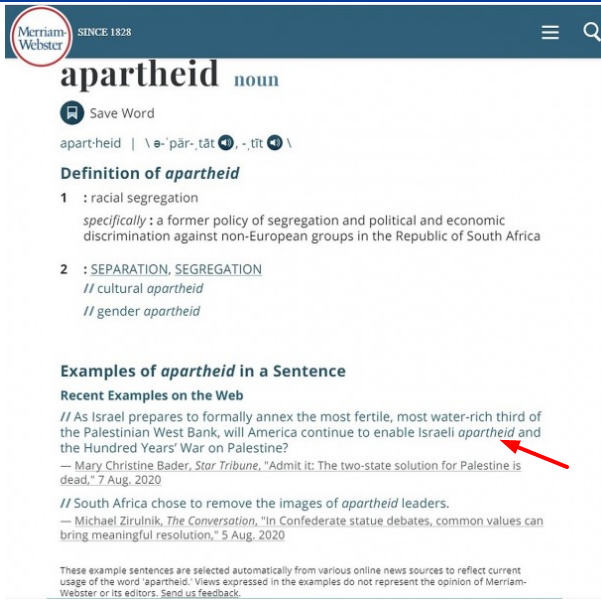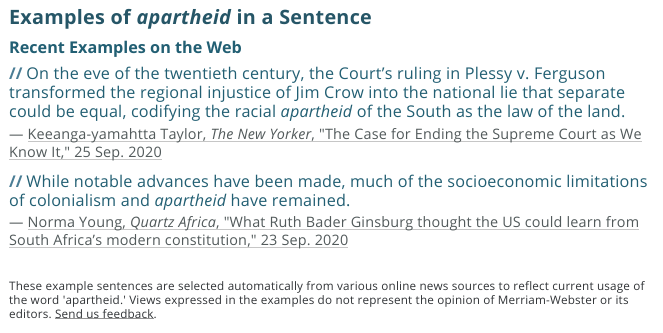Recently Merriam-Webster came under pressure from an online campaign to change one of the example sentences in their online dictionary of English. After a short period of time the dictionary editors caved in and suppressed the disputed example (as reported by Jewish Journal and elsewhere).
Somewhat inexplicably, according to “Merriam-Webster correspondence coordinator Carolyn Polis [… ] the example slipped in as part of an automated program.” In my view, the fact that Merriam-Webster automate their selection of examples would seem to be the best guarantee of impartiality.
The word in question was apartheid.
The entry in dispute, now suppressed, is shown below:

apartheid: Merriam-Webster (August 2020)
As is stated on the same page, “example sentences are selected automatically” and “do not represent the opinion of Merriam-Webster or its editors”. This assurance of evenhandedness was not enough for those who abhor any public criticism of Israeli policy, even when cited merely as an example of language use.
The corresponding dictionary entry at the beginning of October makes no mention of Israel, though it does mention “the racial apartheid of the South” of the USA during the 20th century. This new example is presumably unproblematic for the pro-Israeli policy lobby but risks offending other groups of people, such as Confederacy nostalgics.

apartheid: Merriam-Webster (October 2020)
According to the dictionary’s own proposed definitions of apartheid (racial segregation, separation, segregation) all and any of the above examples are appropriate, it seems to me. So why would the dictionary editors remove an example solely on the grounds of the offence taken by a group of readers? In the last analysis there is no way to avoid offending people. Or, to put it another way, if you ever say anything worth saying about human society, you are bound to offend somebody.
Looking at this issue from the lobbyists ‘ point of view, why take such an interest in a dictionary entry? Undoubtedly, their intention is to censor the dictionary and to “limit the spectrum of acceptable opinion”.
As Chomsky put it,
The smart way to keep people passive and obedient is to
strictly limit the spectrum of acceptable opinion, but allow
very lively debate within that spectrum – even encourage the
more critical and dissident views. That gives people the sense
that there’s free thinking going on, while all the time the
presuppositions of the system are being reinforced by the
limits put on the range of the debate.”Noam Chomsky, The Common Good (1998)
In the lobbyists’ view, the collocation “Israeli apartheid” should be eliminated from public discourse, and in consequence perhaps the concept become an “unacceptable opinion”. Well, they have their work cut out because this expression is very widely used indeed, as a simple web search reveals.
All in all, if the above example is anything to go by, lexicography may be entering a post-descriptive phase. Before corpus linguistics became dominant in the 1980s and was used to compile more objective works, such as the COBUILD Dictionary of English, which was based on the Bank of English corpus of some 650 million words, dictionaries were notoriously lop-sided affairs, all too often recommending or suppressing uses that reflected little more than the prejudices of the editorial team.
Since then descriptive corpus-based lexicogaphy has led to major improvements in the quality of reference works, not only in English but in all natural languages. Any attempt to send dictionaries back to the dark ages of arbitrary prescription – at least in academy-free English – should be resisted, alongwith any drive to make dictionaries “politically correct”.
Meanwhile as users of dictionaries we need to remain alert and ungullible. With this in mind, I have posted a copy of this article to the Merriam-Webster editorial team. We need to push back on this kind of nonsense.
Can Tradiling readers contribute their own examples of overt manipulation of reference works?








